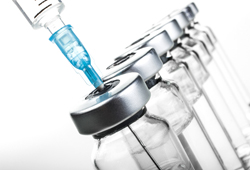 Some noteworthy regulatory and litigation events related to insulin biosimilars have occurred recently.
Some noteworthy regulatory and litigation events related to insulin biosimilars have occurred recently.
On May 13, 2019, FDA held a public hearing entitled “The Future of Insulin Biosimilars: Increasing Access and Facilitating the Efficient Development of Biosimilar and Interchangeable Insulin Products” at FDA’s White Oak campus in Silver Spring, Maryland. The hearing addressed recent advances in insulin biosimilars, adoption of insulin biosimilars by physicians and patients, and FDA’s approach to assessing biosimilarity and interchangeability of insulin biosimilars. In his prepared opening remarks, Acting Commissioner Ned Sharpless observed that against a “backdrop of ongoing and hopeful medical progress is a continuing increase in the prices of insulin products.” He further stated that FDA expects “several important legislative, regulatory, and policy changes” to provide the “opportunity for companies to develop new, less expensive biosimilar and interchangeable insulins.” Dr. Sharpless explained that beginning in March 2020, marketing approval of insulin will be regulated under the Public Health Service (or PHS) Act, which governs most biologics, rather than under the Food Drug and Cosmetic (FD&C) Act, which governs the approval of conventional drugs and generics. According to Dr. Sharpless, the change in the statute will promote “a pathway for follow-on insulin products to become available” and open “insulin and insulin analogs… to biosimilar competition.” In the hearing, FDA sought stakeholder input about factors that FDA “should consider in evaluating information submitted by applicants for new biosimilar products.” Webcast recordings of the entire event are available here.
On May 9, 2019, Judge Stanley Chesler of the District of New Jersey issued a claim construction order in Sanofi-Aventis v. Mylan, 17-9105 concerning Mylan’s proposed insulin-glargine product. The suit involves two sets of patents, one directed to insulin formulations and the other directed to prefilled delivery pen devices. Other than a single term for which the Defendants’ construction was unopposed, Judge Chesler held that for the remaining 16 terms, neither party had “overcome the presumption that each term has its ordinary meaning,” and assigned to each its plain and ordinary meaning. Specifically, the Court made the following claim construction findings:
- “chemical entity” means “chemical compound”
- “piston rod” means “a rod that can advance the piston”
- “clutch” means “a component that can operate to reversibly lock two components in rotation”
- “drive sleeve” means “an essentially tubular component configured to transfer force to the piston rod”
- “driver” and “driving member” means “a component configured to transfer force to the piston rod”
- “clicker” means “a component that clicks”
On the IPR front, on May 2, 2019, Pfizer filed nine IPR petitions challenging five of Sanofi’s patents related to pen-type injectors, U.S. Patent No. 8,679,069 (IPR2019-00979); U.S. Patent No. 8,992,486 (IPR2019-00980, IPR2019-00981, IPR2019-00982); U.S. Patent No. 9,604,008 (IPR2019-00987); U.S. Patent No. 9,526,844 (IPR2019-01022, IPR2019-01023). As we previously reported, Mylan filed a number of IPR petitions challenging these same patents in September of 2018, and the Board recently instituted IPR proceedings regarding each of these patents. Pfizer has also filed motions for joinder with its IPRs to join Mylan’s instituted IPRs.
Stay tuned for more coverage on insulin biosimilars.
